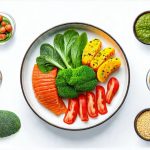Gas and bloating are incredibly common digestive experiences that most people deal with at some point. They can range from mildly uncomfortable to significantly disruptive, impacting daily life and causing considerable distress. Understanding the reasons behind these occurrences is often the first step towards managing them, and surprisingly, many everyday foods can contribute to increased gas production or feelings of fullness and discomfort. This article explores some of the most frequent culprits and offers insight into why they cause these effects.
The human digestive system is a complex process, and individual tolerances vary greatly. What causes bloating in one person may not affect another. Factors like gut microbiome composition, underlying sensitivities, and eating habits all play a role. However, recognizing potential triggers within your diet can empower you to make informed choices and potentially reduce unpleasant symptoms.
Understanding the Root Causes
Gas production is a natural part of digestion. It’s created when bacteria in the large intestine ferment undigested carbohydrates. Some foods are more prone to fermentation than others due to their composition. Bloating, on the other hand, often relates to the amount of gas present but can also be influenced by how quickly food moves through the digestive system and individual sensitivity levels. It’s not always about what you eat, but how your body processes it.
Common Food Groups & Their Effects
Many seemingly harmless foods can contribute to gas and bloating. The key is often identifying which specific items cause issues for you. Keeping a food diary can be incredibly helpful in pinpointing these triggers. This helps distinguish between general sensitivities and reactions to specific foods.
High-FODMAP Foods
FODMAP stands for Fermentable Oligosaccharides, Disaccharides, Monosaccharides And Polyols. These are types of carbohydrates that are poorly absorbed in the small intestine and therefore ferment in the large intestine, producing gas. Common high-FODMAP foods include onions, garlic, apples, pears, wheat, beans, lentils, milk (for those lactose intolerant), and certain sweeteners like sorbitol and mannitol. Reducing FODMAP intake, often under guidance from a healthcare professional, can sometimes significantly alleviate symptoms for individuals with sensitive digestive systems.
Cruciferous Vegetables
Broccoli, cauliflower, cabbage, Brussels sprouts, and kale are incredibly nutritious but also known gas producers. These vegetables contain raffinose, a complex sugar that the human body doesn’t easily digest. As with other fermentable carbohydrates, bacteria in the large intestine break down raffinose, resulting in gas production. Cooking these vegetables can sometimes help reduce their gas-producing effects, as it partially breaks down the raffinose. Smaller portion sizes may also be easier to tolerate.
Legumes and Beans
Beans, lentils, chickpeas, and other legumes are rich in fiber and protein, making them a healthy dietary addition for many. However, they contain oligosaccharides – another type of carbohydrate that’s difficult for the body to digest. Similar to raffinose in cruciferous vegetables, these carbohydrates ferment in the large intestine, leading to gas. Soaking beans overnight before cooking or using commercially available enzyme products designed to reduce gas can sometimes help minimize their effects. Gradually increasing legume consumption may also allow your gut microbiome to adjust over time.
It’s important to remember that dietary changes should be approached thoughtfully and with consideration for individual needs. If you experience persistent or severe bloating, it’s always best to consult a healthcare professional to rule out any underlying medical conditions. They can provide personalized advice and guidance based on your specific situation. Paying attention to how different foods affect your body is the most effective way to manage gas and bloating and maintain comfortable digestion.


















